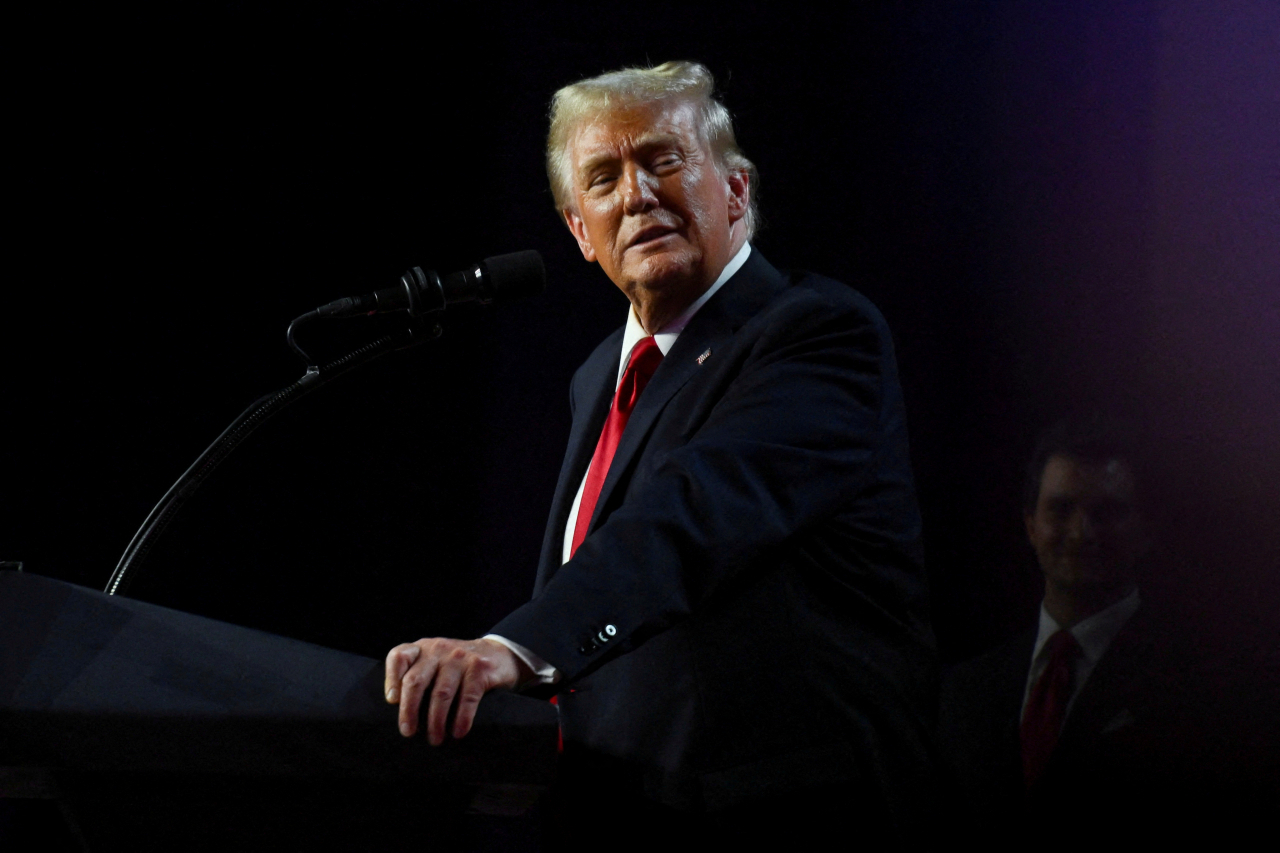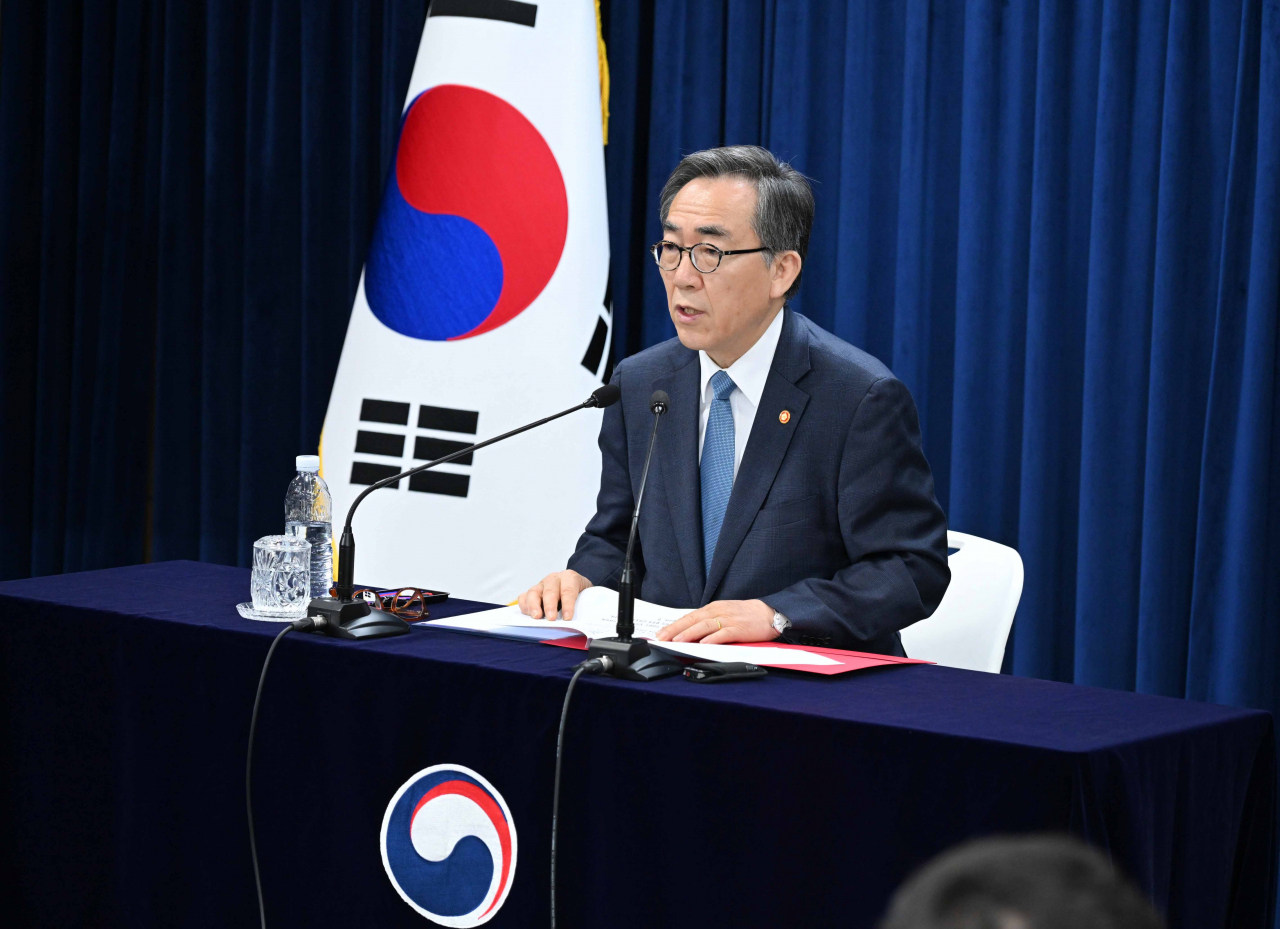 |
Then-Republican presidential nominee and former US President Donald Trump takes the stage following early results from the 2024 US presidential election in Palm Beach County Convention Center, in West Palm Beach, Florida, on Nov. 6. (Reuters) |
US President-elect Donald Trump’s high-stakes, unpredictable leadership could bring new "costs" to South Korea while giving allies a rare chance to translate decisions swiftly into action with greater momentum, a high-level Seoul official said Tuesday.
"One risk factor lies in the increased uncertainty associated with President-elect Trump's leadership style, which amplifies unpredictability," a high-level Foreign Ministry official said during a closed-door press briefing, responding to The Korea Herald's question on the risks and opportunities of Trump’s second term.
“His fundamental strategy is to enhance the US' bargaining power by increasing leverage through uncertainty, regardless of whether the counterpart is an ally, a friendly country or a hostile state. This approach may lead to costs for us rather than posing a risk factor,” the official said.
However, the official noted that opportunities still exist for US allies under a second Trump term.
“The opportunity lies in areas where Korea and the US are fully aligned, without any political nuances or differing opinions. In such cases, action can be taken more swiftly,” the official said.
“There is a possibility that the usual complex considerations may be simplified compared to past (US) administrations. If (allies') interests align, this could allow for us to take quicker, more decisive actions. I have a tentative sense that this could be the case.”
At the same briefing, Foreign Minister Cho Tae-yul highlighted that Trump’s policy emphasis on an expanded role and security contributions from allied nations aligns well with South Korea’s vision of a “global pivotal state,” committed to fulfilling responsibilities that match its national strength and status.
Cho added that the Trump administration’s first term and the Yoon administration share strong alignment in their Indo-Pacific strategy.
"The Foreign Ministry intends to further strengthen cooperation with a second Trump administration through detailed policy coordination based on these policy alignments," Cho said.
 |
Foreign Minister Cho Tae-yul delivers remarks at a press briefing held Tuesday at the Government Complex building. (Republic of Korea Ministry of Foreign Affairs) |
When asked by The Korea Herald about the Foreign Ministry’s alliance-related priorities for discussions with the incoming Trump administration, the unnamed official said the ministry would concentrate on areas where Trump’s second term is expected to diverge from Biden’s approach.
"We will identify areas where the Trump administration differentiates itself from the Biden administration regarding the Korea-US alliance. Then, the focus will likely shift to coordinating policies in those areas, which seems like the most logical course of action,” the official said, without providing concrete examples.
Concerning a potential request from Trump to renegotiate the defense cost-sharing agreement from 2026 to 2030 that was officially signed on Nov. 4, the unnamed official emphasized the importance of “having it ratified by the National Assembly and brought into effect” to bolster South Korea’s position and “ensure legal stability.”
The signed 12th Special Measures Agreement requires National Assembly ratification in South Korea, whereas in the US, it is treated as an executive agreement that allows Trump the authority to revoke or renegotiate the agreement.
The unnamed high-level official also acknowledged the possibility of Trump pursuing another summit with North Korean leader Kim Jong-un, though emphasized that nothing is certain and much remains in flux.
"President-elect Trump’s typical negotiation strategy often begins with a hard stance to disrupt the status quo, followed by moves to advance national interests. With this approach, I personally believe there’s a fair chance he will follow the same path if he pursues dialogue with North Korea," the official said.
"However, the essential point is that any dialogue with North Korea should be led by South Korea's initiative and reflect our position, which is the most critical prerequisite."
Regarding South Korea’s Russia policy, the official gave an affirmative response when asked by The Korea Herald whether the end of the Ukraine war could serve as a key factor in adjusting Korea’s stance toward Russia.
"Is it possible to adjust relations with Russia once the war in Ukraine ends? It would be difficult for relations to immediately normalize simply because a cease-fire is reached. Many variables will depend on the conditions under which the cease-fire occurs and the postwar resolution process,” the official said.
"However, I can confidently say that our scope for diplomatic engagement with Russia will likely be significantly broader after the war than it is during the war," he said of South Korea.
The official, however, clarified that given the current situation -- with Russia continuing its invasion of Ukraine and North Korea supporting Russia in the unlawful war -- achieving meaningful progress in dialogue between Seoul and Moscow remains challenging.
“Diplomacy with Russia is ongoing,” the official said. “However, expecting any improvement in relations under these circumstances is ultimately highly unrealistic.”